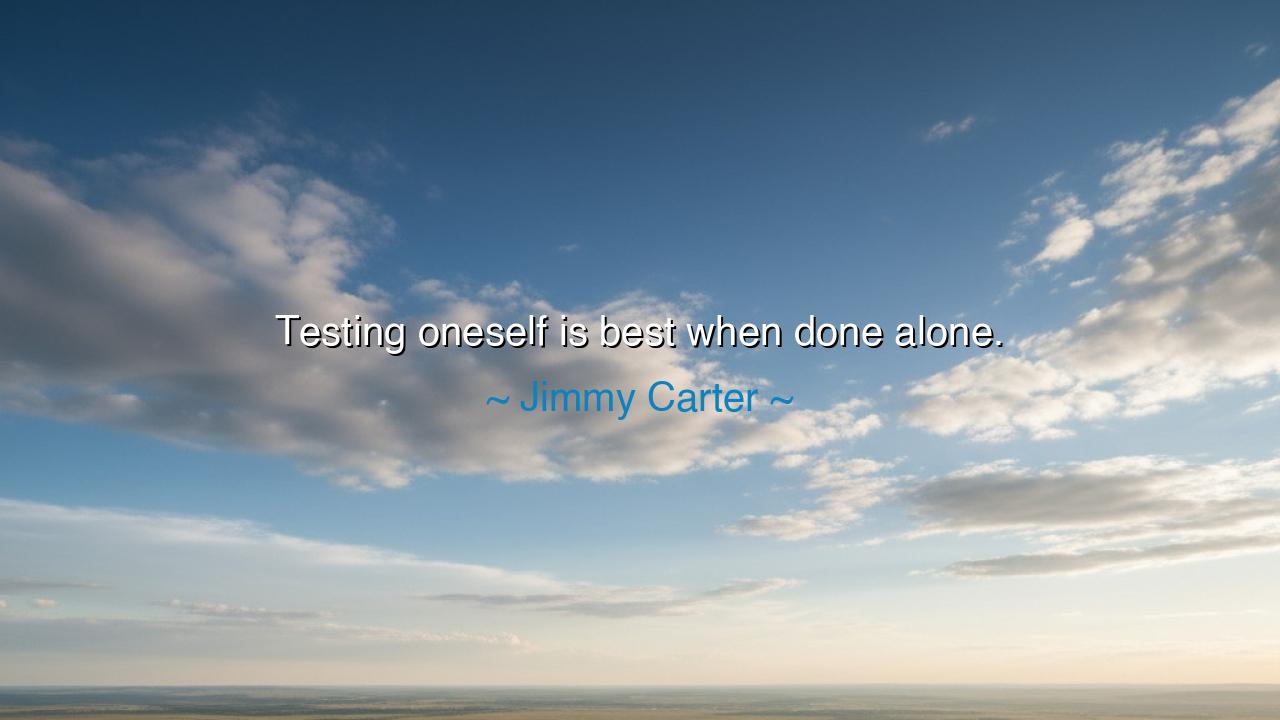
Testing oneself is best when done alone.






In the steady and reflective words of Jimmy Carter, a man of both humility and strength, we hear a truth that resonates through the ages: “Testing oneself is best when done alone.” Beneath the quiet tone of this statement lies a call to courage, introspection, and integrity. Carter, a leader who walked the narrow path between power and conscience, reminds us that the truest trials of character are not those performed before the eyes of others, but those faced in solitude — in the unseen chambers of the heart. For it is there, when we stand without witnesses, that the soul reveals its true measure.
The origin of this wisdom rests in Carter’s lifelong belief in discipline and self-examination. Raised in the modest farmlands of Georgia, he learned early that integrity was not proven through reputation, but through private choices — the decisions made when no applause can be won and no shame can be avoided but one’s own. As a statesman and humanitarian, Carter faced criticism and failure with grace, never seeking glory in the eyes of others. His life, from the peanut fields to the presidency, was marked by the same inward rigor he preached: that one must be willing to test oneself not in comparison to others, but against one’s own ideals.
The ancients, too, held this truth sacred. The philosopher Seneca wrote, “The greatest blessings of mankind are within us and within our reach,” and he taught that the wise man must retreat into himself to know his worth. Socrates, standing before his judges, declared that the unexamined life is not worth living — not because others must approve, but because the self must be understood. To test oneself alone is to remove the mask of performance, to stand bare before the mirror of truth. The crowd may cheer or condemn, but in solitude, the voice that matters most — the quiet, honest voice within — cannot be deceived.
Consider the story of Ernest Shackleton, the Antarctic explorer. When his ship, the Endurance, was crushed by ice, he and his men faced death on a frozen sea. Shackleton’s courage and leadership are legendary, but what few speak of are the long nights when he stood watch alone, his men asleep, wrestling not with frost or hunger, but with doubt. In that solitude, he faced his truest test — not of endurance, but of spirit. And from that inner strength came the resolve that saved every life under his command. Solitude, for him as for Carter, was the crucible of greatness.
To test oneself alone is not to reject others, but to refine oneself without the noise of the world. There is a kind of purity in solitude, where motives are laid bare. When one struggles privately — to overcome fear, to keep faith, to act with honor — there is no room for pride, only truth. The applause of others can intoxicate; the judgment of others can mislead. But when you strive in silence, guided only by conscience, you discover the raw essence of who you are. That is the heart of Carter’s wisdom: that character is forged in solitude, not in spectacle.
Yet, this path requires bravery. It is easier to be tested in the sight of others, where sympathy or admiration may soften the blow of failure. But to be tested alone is to meet one’s limits face-to-face, to hear the silence of doubt, and still to rise. The warrior in the field, the artist before the blank page, the seeker in prayer — all must enter that lonely arena where no one can fight for them. And in that space, the victory — however small — becomes sacred, because it is entirely one’s own.
Therefore, my child, take this teaching into your soul: do not fear solitude, and do not flee from the inner tests that await you there. When life grows quiet, and the noise of the crowd fades, listen for the voice of truth within you. Ask: “Am I who I claim to be? Am I living according to what I know is right?” Let that question burn like a lamp in your heart. Whether you triumph or stumble, it is the act of facing yourself that strengthens the spirit. For in solitude, the soul grows honest, and in honesty, the soul grows strong.
So let Jimmy Carter’s words be your compass: “Testing oneself is best when done alone.” Seek not validation in the eyes of others, but virtue in the eyes of your own conscience. The truest strength is quiet, the greatest victory unseen. And when you emerge from the solitude of your testing, you will not need the world’s praise — for you will know, in the secret depths of your being, that you have stood the trial and found yourself whole.






AAdministratorAdministrator
Welcome, honored guests. Please leave a comment, we will respond soon